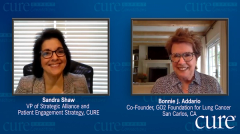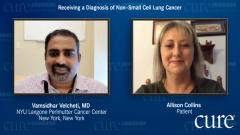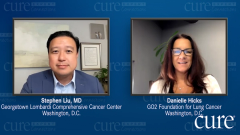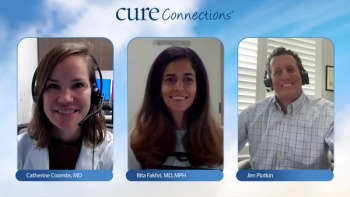
The Importance of Clinical Trials in Non-Small Cell Lung Cancer
A brief discussion on the importance of enrolling in clinical trials and when that may be an option in non-small cell lung cancer.
Episodes in this series

Vamsidhar Velcheti, M.D.: Allison, you mentioned that your oncologist, [Neal] Ready, [M.D., Ph.D.,] talked to you about clinical trials. How did that discussion go? What was your perception? What was your understanding of clinical trials back then? Did you have anyone in your family who was a point person to discuss what clinical trials were?
Allison Collins: Well, mostly my husband. My husband did a lot of research from the time that I had gotten diagnosed and we were waiting. He went online, and [saw] I think ex-President Jimmy Carter. “Oh, he took Keytruda for melanoma, and these drugs work really good. If you’re a candidate for it, I think you really need to take this if you’re offered that.” Me, I was just devastated more so, I think probably because of watching my mother go through what she went through, and I wouldn’t read anything. I just stayed to myself. I think I cried all the time, but my husband did a lot of research, did a lot of that for me.
Vamsidhar Velcheti, M.D.: I think it’s really important to have caregivers who are willing to go and research things and try to understand what the treatments are. One thing that I want to highlight for the audience, there are obviously a lot of misconceptions about what clinical trials are, and I think it’s really important to dig into this a little bit deeper. When we talk about treatments for lung cancer as I said, 10, 15 years ago, we were giving chemotherapy to all our patients. We were giving treatments without knowing how well it’s going to work or just hoping that it’s going to work. And now we’ve come such a long way with a lot of different drugs that are FDA approved, which improve new treatments, we’re shifting the paradigms a lot. We never used to use the word cure for patients with lung cancer. Back when I was training, the first thing I was taught was, if somebody has stage 4 lung cancer, you go into the room and say that, “You are going to die from this cancer.” We’ve come a long way from then, so there’s so much hope. The reason why there’s so much hope is because we’re trying to push the envelope and trying to develop new treatments that can do better than the previous treatments.
The whole idea of a clinical trial is that we have treatment right now for lung cancer. This is the treatment. Can we do better than this? We go in with the hypothesis that, “Hey, we have a drug that works really well in animals. We’ve tried this in the laboratory, we’ve tried this on animal models, and it works really well, and I think this is going to work better.” So then there are a lot of different types of clinical trials, there are phase 1 trials, phase 2 trials [and] phase 3 trials. The whole idea of a clinical trial is, can we do better than the existing treatments that we have today? So when you walked into Dr. Ready’s office, obviously the treatment back then in early 2018, was chemotherapy. The clinical trial idea was, “Hey, I think we can do better than the chemotherapy. Here is what we have. It’s not FDA approved, but let’s see if it actually works better than chemotherapy.” At any stage of a patient’s journey through cancer diagnosis, a clinical trial is always a better option in patients who have cancer, because you’re always trying to do better than what’s the standard treatment. There are a lot of ethical guidelines for clinical trials, and a lot of things come up when we talk about clinical trials. Patients have a misunderstanding that they’re going to have an experiment. It is experimental therapy, but it goes through various phases before we test it. Let’s say there is a placebo-controlled trial, it is never appropriate to deny patients a standard treatment and give you an experimental treatment without evidence that it’s going to work.
For somebody like yourself, the clinical trial would be something more than the standard chemotherapy, or some treatment that we know that works based on your gene testing results. For example, you mentioned that your tumor had high PD-L1 protein. Suppose you have the high PD-L1 protein, we know that these immunotherapy drugs work much better than chemotherapy. So there’s a really strong reason why the clinical trial would make much better sense, and we would have done much better than standard chemotherapy. Thankfully in your case, you’ve been on immunotherapy for such a long time, and it’s been over two and a half years now, actually, more than that. That’s a testament to the science and how these drugs are developed. I encourage all my patients to actively ask your oncologist if there’s a clinical trial that would make sense for your particular type of cancer.
Transcript edited for clarity.



